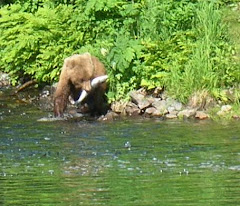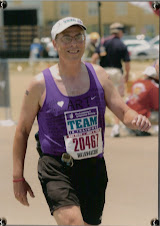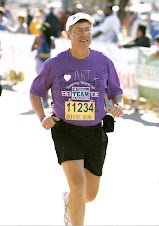As part of my series of posts refuting that Team in Training is a scam, I just have to discuss the charges I saw a number of times on running and triathlon blogs saying that TNT essentially ruins everyone else's experience. While I am calling BS on this one, I do agree that every runner and triathlete - whether wearing a purple singlet or not - should be aware of race etiquette and practice good sportsmanship.
Here are a few of the comments that I read, paraphrased to some extent: "I'm sick of dealing with throngs of TNTers every time I try to do a major race." "Inexperienced runners get in the way and gum up the works." "Charity runners attempt to equate themselves with much better runners. It is deceitful, disingenuous, and hurts the sport." "They are not courteous on the race course. They and their coaches tend to think that everyone in purple are the only ones who matter. They cut people off and stop in front of you." "No one likes TNT when five purple shirts are lined up across the entire road." I also saw a number of negative comments about slow runners, and very disparaging remarks about TNT "Tubbies."
Wow, where to start? Well, how about the comment about being sick of throngs of TNTers in every major race? This makes no sense. From what I can tell, the only races with throngs of TNTers is the Nike Women Marathon / Half Marathon (something like 18% of participants are with TNT), and perhaps the San Diego Marathon. Most races just don't have that many Team in Training participants - it is simply too difficult to do the fundraising. For example, the Country Music races when I participated in 2009 had 650 participants from TNT out of something like 35,000 participants. That's less than 2%. Here are a few more figures from various races last year: Marine Corps Marathon: 358 (of 30,000); Shamrock Marathon and Half Marathon: 160 (of (11,000); Dublin Marathon: 135 (of 11,245); Honolulu Marathon: 149 (of 25,000); RNR Savannah: 523 (of about 23,000). So throngs of TNT runners ruining the race experience for everyone else? Once again, I call BS!
The comments about inexperienced and slow runners, not just TNT, gumming the works also do not make a lot of sense. These runners and walkers will be in the later corrals. The only people they might interfere with would be other slow runners. Anyone with any speed will be well ahead of them. Of course, we've all seen runners who think they are fast enough for an earlier corral and are not. But that seems universal at all races I have been in. I pass plenty of people in the races I have done who started well ahead of me, and I am no speed demon - trust me.
I've never talked to a charity runner who equates themselves with the top runners. I have no idea why anyone would make such a comment. If you feel that way, please email me or leave a blog comment, because I just don't get that one.
The comments about inconsiderate runners might fit a lot of people on the race course. I've certainly seen a few from TNT who are not paying attention during the race, who run or walk too many abreast, who cut in front of people, who stop suddenly. I've seen plenty of others not in purple do the same thing. I think this behavior is not universal, and not even that common - our coaches at TNT stress race etiquette during our training, whether or not we choose to follow it - but anyone doing a race needs to be cognizant of their impact on others. Race etiquette is an important enough topic that I plan a separate post.
TNT coaches certainly give higher interest to TNT participants than general runners. That is why they are there. But I think most coaches will give encouragement and aid to any runner who needs it. Maybe it is not as common as it should be. Coaches reading this - read and heed, and give some thought to making a good impression on the race course. I have seen TNT coaches go above and beyond - I saw one coach in Nashville escorting an exhausted (non-TNT) participant all the way to the finish for the last half mile.
The negative comments about slow runners and "tubbies" are offensive enough that I will write a dedicated post.
I'll welcome any comments about this topic, as long as they are constructive and factual.
The Group Hike That Kind of Wasn't
6 years ago




















7 comments:
I often tell my participants to link arms and run 17 minute miles! Yes, we coaches help any runner that needs assistance during an event. I can honestly say that I'm known for helping everyone. I even know all the shortcuts!
17 minute miles? Incredible speed! Oh, that is for the final kick, right?
Yes, I've seen our coaches help and encourage any runner or walker who needs it.
The comments about inexperienced and slow runners, not just TNT, gumming the works also do not make a lot of sense. These runners and walkers will be in the later corrals. The only people they might interfere with would be other slow runners. Anyone with any speed will be well ahead of them.
You're missing runners from shorter events that could impede faster runners of longer events as they come to a combined finish-- the 3:20 half marathoners in front of the 3:20:15 marathoners, the 1:15 10k walkers in front of a 1:15 half-marathoner, etc. Not common, but as a front-third of the pack runner I've had approximately 10 such instances in 120 lifetime races.
Anonymous - that is a fair point. I know that the Shamrock Half and Full (I am running the half in six weeks) has a combined finish. I also know that they start the races at different times to try to minimize race contention. It is also not a crowded field - maybe 11,000 total in the two events. I think the key thing that people should not run or walk more than two abreast in races to leave plenty of room for folks to pass. And stay to the right as much as possible so faster people can pass to the left. I know in the really crowded fields - the Monument Avenue 10K for example with 42,000+ in the field, it does get very crowded. While there are only a handful of TNT runners in that field, there are tons of people who put themselves in too high a corale, and they tend to run and walk in big groups. But that is just the nature of that race. After the first mile it thins out and you can mostly run your own pace. Thanks for the comment. Art
Anonymous - congratulations on completing 120 races. That is truly astounding. Art
Best of luck to you, Art! I'm a long-time runner having the sensibilities of the first running boom. I feel the issue is often bringing together different cultures/approaches on race day-- the extremes can clash. Imagine a golf course having a charity tournament, club championship, and regional tournament running simultaneously.
And to you as well. That is another good point you made. Different people have different goals for the race, coming from their interests and race culture. I like your image of the golf course. As our coach tells us, running is the only sport where we are stepping on to the "playing field" with the best in the world - essentially running in their footsteps. I think as long as people show good ettiquette and proper respect, it generally works out. Race directors like to have as many as possible running in their events. Our 10K here is now the 15th biggest foot race in the world, I think. It was about half as big 7 years ago when I was first in it.
Post a Comment